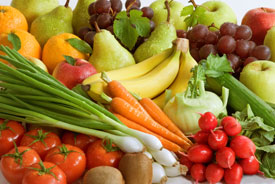 With so many fad diets popular today, it can be tricky to know exactly what benefits your body most.
With so many fad diets popular today, it can be tricky to know exactly what benefits your body most.
At our practice, we believe that a healthy, balanced diet is the way to go, and there are five key things you should make sure to get enough of each day.
What are they? Find out below!
1. FIBRE (also known as prebiotics) - Green leafy veggies like broccoli, spinach, kale, Brussels sprouts, and cabbage are excellent sources of fibre. Variety is key when it comes to vegetables to ensure you receive an abundance of vitamins and minerals daily. Aim to eat the rainbow! Fibre is needed for optimal bowel function, as well as maintaining healthy gut bacteria. Fibre is the “food” for our gut microbes, therefore, if we are not eating enough fibre, we will suffer digestive consequences. Aim for 30-60g of fibre a day. Speak to a qualified health professional for ideas of how to incorporate more fibre into your diet and what amount is right for you.
2. PROBIOTICS - Excellent sources include coconut yoghurt, Greek yoghurt, sauerkraut, kimchi, kombucha, and kefir. These foods promote a healthy balance of good bacteria in the gut. The live bacteria we receive through probiotcs are beneficial for our GIT (gastrointestinal tract) and strengthening the immune system (as many of our immune cells are synthesized in the gut). They help digestion by cleaning out the gut, and assist with absorption of nutrients from the foods we eat. Probiotics need to be fed (from fibre aka prebiotics) in order to remain active and healthy. Prebiotics and probiotics go hand in hand–you can’t eat one without the other and expect results.
3. HEALTHY FATS - Choose foods like avocado, unsalted raw nuts and seeds, hemp seeds, olive oil, salmon, and sardines. Healthy fats help with hormone production and regulation, as well as keeping us fuller for longer. They are important for the slow release of energy in the body; therefore, controlling spikes in blood sugar levels in-between meals; and help maintain a healthy body weight. Healthy fats also work towards reducing inflammation in our body, and improve heart and brain health.
4. HIGH QUALITY SOURCES OF PROTEIN - Choose things like legumes, quinoa, buckwheat, grass fed red meat, salmon, wild caught salmon, sardines, and lean organic chicken or turkey. Your body relies on protein as the building blocks to build and repair muscles and tissues. It is also needed to produce hormones, enzymes, neurotransmitters, bones, skin, cartilage and blood. Protein helps us feel full and can helps maintain weight and aid in weight loss.
5. TURMERIC - The active component in turmeric, curcumin, is essential to fight inflammation and increases antioxidant activity in the body. Turmeric helps improve brain function as it is a driver of brain-derived neurotrophic factor (BDNF), which is a type of growth hormone that functions in your brain. Some studies show it can help fight depression and Alzheimer’s disease. You can add this spice to soups, stir fries, lattes, broths, dips and more!
Wondering what else you can do to stay healthy? Book a nutrition consultation with Lisa today.
